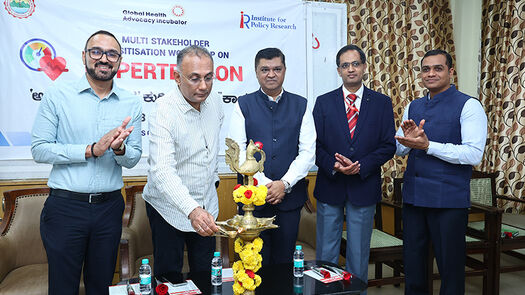February 19, 2026
November 25, 2025
Evidence to Action: GHAI Joins Global Experts at the INFORMAS DECADE2 Meeting

The Global Health Advocacy Incubator (GHAI) recently joined food and nutrition experts from around the world at INFORMAS DECADE2, a strategic meeting held in Cuernavaca, Mexico, from November 10–14, 2025. More than 40 leading researchers and experts came together to map out how they will work to improve the food environments that shape our diets and public health over the next decade.
Dr. Nadia Flexner, Associate Director of Research for GHAI’s Cardiovascular Health Program, participated throughout the week and co-led a paper on the role of policy-relevant research in advocacy and policymaking—ensuring that strong evidence leads to strong policy. Dr. Verónica Schoj, GHAI’s Vice President of Food and Nutrition, joined the advocacy-focused sessions to share strategies for advancing policy change and strengthening government accountability. The Centro de Investigación en Nutrición y Salud (CINyS) at Mexico’s Instituto Nacional de Salud Pública (INSP) hosted the meeting.
INFORMAS—the International Network for Food and Obesity/non-communicable diseases Research, Monitoring and Action Support—is a global network launched in 2012 by researchers and public health actors to help countries better understand and improve their food environments. It was created in response one of the biggest drivers of poor health and inequality worldwide: malnutrition in all its forms, from obesity to nutrition-related noncommunicable diseases to undernutrition and micronutrient deficiencies, with rates already high or rising in nearly every country.
Over the past 12 years, INFORMAS has become a trusted source of independent, high-quality research. Its monitoring protocols and methods have been used in more than 70 countries and over 140 institutions and have produced hundreds of publications that have advanced food-environment monitoring globally. This body of work has helped spark meaningful policy change—especially across Latin America and Africa—by giving governments and civil society the data they need to advocate for healthier, more affordable and more sustainable food environments.
At the INFORMAS DECADE2 meeting, participants reviewed and updated 14 INFORMAS protocols. They also identified new priorities and strengthened the connection between research, advocacy and policy action. Sessions focused on how food environments are rapidly changing, including the rise of digital marketing, the growing influence of the food industry, the availability of new technologies and artificial intelligence and the need to apply sustainability and equity lenses to achieve greater impact.
Key priorities included updating protocols to better capture equity issues; expanding focus areas to include environmental sustainability, all forms of malnutrition and commercial determinants of health; exploring how technologies like AI and digital monitoring can improve data collection; and strengthening training and support for young researchers. Participants also discussed papers for a journal supplement planned for 2026, which will share updated protocols and recommendations with the broader public health community.
This event highlighted the power of bringing researchers and advocates together. When evidence and advocacy are closely linked, countries are better equipped to push for evidence-informed policies that can protect public health and promote fair, sustainable food systems.
Working alongside the INFORMAS community, GHAI remains committed to helping turn research into action—and creating healthier and more equitable food environments.



